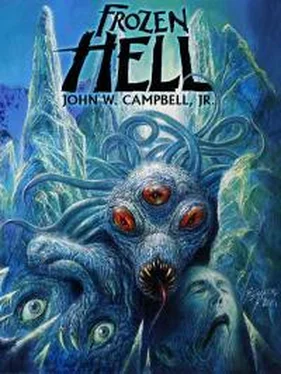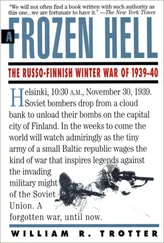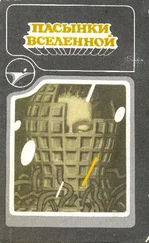Джон Кэмпбелл - Frozen Hell
Здесь есть возможность читать онлайн «Джон Кэмпбелл - Frozen Hell» весь текст электронной книги совершенно бесплатно (целиком полную версию без сокращений). В некоторых случаях можно слушать аудио, скачать через торрент в формате fb2 и присутствует краткое содержание. Год выпуска: 2019, Издательство: Wildside Press, Жанр: Фантастика и фэнтези, на английском языке. Описание произведения, (предисловие) а так же отзывы посетителей доступны на портале библиотеки ЛибКат.
- Название:Frozen Hell
- Автор:
- Издательство:Wildside Press
- Жанр:
- Год:2019
- ISBN:нет данных
- Рейтинг книги:3 / 5. Голосов: 1
-
Избранное:Добавить в избранное
- Отзывы:
-
Ваша оценка:
- 60
- 1
- 2
- 3
- 4
- 5
Frozen Hell: краткое содержание, описание и аннотация
Предлагаем к чтению аннотацию, описание, краткое содержание или предисловие (зависит от того, что написал сам автор книги «Frozen Hell»). Если вы не нашли необходимую информацию о книге — напишите в комментариях, мы постараемся отыскать её.
Frozen Hell — читать онлайн бесплатно полную книгу (весь текст) целиком
Ниже представлен текст книги, разбитый по страницам. Система сохранения места последней прочитанной страницы, позволяет с удобством читать онлайн бесплатно книгу «Frozen Hell», без необходимости каждый раз заново искать на чём Вы остановились. Поставьте закладку, и сможете в любой момент перейти на страницу, на которой закончили чтение.
Интервал:
Закладка:
FROZEN HELL, by John W. Campbell, Jr.
CHAPTER ONE
McReady stuck his head barely above the surface, and looked off toward the north. The sun was a dulled wheel of light barely hanging on the horizon of an ice-bound plateau. The wind that had started with a mad slide down the foothills of the South Polar Plateau 800 miles to the south, and strengthened in its sweep across the glacier-locked continent, had lost nothing of its edge. Thirty miles of wind from the southeast, honed by 75 degrees of frost.
It carried a few sharp-edged, fine grains of ice, mementoes of their digging three days before. It wasn’t drift. The high, bald plateau had been scoured free of drift-snow ages ago; the unending winds had swept a huge patch 10 miles in diameter as bald as a buzzard’s throat.
McReady grinned behind his face-muffling scarf and adjusted his goggles. The physicists could be relied on to pick a place like this to roost. A quarter mile away, the orange paint of the tractor and the lesser blot of its trailing sledge loomed out of a dusk which represented two o’clock on a spring afternoon—October, in fact. October 2, 1939.
Barclay was running toward him, downwind like a man going down hill, his ice crampons sending up showers of ice chips that swirled away in front of him in the wind. Suddenly his feet went out from under him, and the wind tossed him along for ten yards before he caught himself and he climbed to his feet again. The padding of his coat and many layers of thermal clothing protected him from serious injury.
When Barclay reached the Secondary Magnetic Station, the wind shied a larger chip of ice against his goggles. It might have blinded him without their protection. McReady stepped back, giving him room. Barclay cursed, ducked through the flapping canvas door, and climbed backwards down the small ladder into the Station’s antechamber.
“Christ, Mac,” he said, voice dulled by layers of wool, “do you like this weather so much you’ve got to stand out in it?”
McReady smiled slowly. The sky was cloudless; only the drumming organ music of the wind and the wash like the slipstream of a transport plane suggested a storm.
“This place fascinates me. As a meteorologist, I’m always interested in storms. Anywhere else I’ve ever been, I’d call this a storm, but it’s been blowing steadily for four consecutive days, ever since we came here. The barometer hit 23 inches on the way down. I wonder…what would a real storm be out here?”
Barclay inched his head up above the level of the blue ice, into which they had cut the Secondary Magnetic Station. His goggles flashed twin reflections of the white of the sun
“If there were water,” Barclay mused, “it would be hell and high water. Dutton at Big Magnet reported fine, clear skies, wind SW 5. Bah! This is the world’s worst spot for a camp. I’ve some notes for them from Big Magnet that may keep them underground for a while.”
McReady reached up and tied shut the outer canvas door-flap. Then they went through the next door—a wood one—into the Station proper.
The roof of tent canvas laid across chicken wire and slats, weighted down by chunks of ice cut out in the making, rested across bolted uprights. Fiberboard panels made up the side walls. A copper stove, in the center of the room, succeeded in bringing the upper layer of air to about 80 degrees, but the wooden floor had a tracery of ice crystals scattered over it. Wind growled threats down the stove pipe.
Norris and Vane sat on the edge of Norris’s bunk, working over a sheaf of data sheets. Above the table, they were clad in long-sleeved grey woolen underwear and shoulder-length hair. They had on light khaki trousers, and the clothing increased in thickness as it approached the floor, ending in knee-length wool socks, and heavy, fur-lined boots. Perishable stores were kept frozen on the floor, while dry cells, beer, and food stock took to the temperate climate half way up. The tropics near the 7-foot ceiling were reserved for drying socks, two suits of underwear, and Vane’s bunk.
The galley was tossed into the stock-box at present, its space preempted by the magnetic instruments Norris and Vane were working over. McReady’s meteorological instruments, being of a more rugged type, were fastened to the wall. McReady crossed to check the recording anemometer card. It showed an almost straight line across the dial—30 to 35 miles of wind during every hour of the last 20. The thermometer showed greater activity, climbing to a height of -40°.
“Get through with the schedule?” Vane looked up toward Barclay.
“The batteries thawed out enough, but they won’t stand many more shots. I’ll have to use the dynamo next time, and you’ll have to shut down shop, I’m afraid, Vane.” Barclay nodded toward the magnetic instruments. “Dutton said my stuff was just coming in, and his voice was weak in the receiver. Here are the data. I’ll try to turn it into English letters, if you can’t read it, but it’s damned hard to write on that rig.”
“I know.” Vane nodded. “Did it work, though?”
“Well—in a way. I didn’t get frost-nipped much, and I didn’t get burned much, but trying to use a primus stove for a writing table isn’t quite the best way to do things.” Barclay shrugged. “Commander Garry wanted to know if you’d gotten any answers yet, and I replied none that I knew of. Right?”
“Not altogether.” Norris poked a stubby finger at a large scale sketch-map of the area, which included their Secondary Magnetic Station as well as the main Antarctic base camp at the South Magnetic Pole, 78 miles away. He had drawn a small X near the Station. “The data we got from Big Magnet combined with what we got here during the last 24 hours make the magnetite-mountain idea impossible. It seems to be a meteor or something of the sort. Apparently a very considerable mass of extremely dense material, far too small and concentrated to be an iron-oxide mountain.”
“A meteorite?” McReady looked doubtfully at the spot marked on the map. “About a half mile away, eh? But would a meteorite affect your instruments at Big Magnet?”
Norris nodded. “Big Magnet is directly over the South Magnetic Pole of the Earth, therefore the compass needle should point directly downward. There is no horizontal component—that is, a horizontal compass needle would say that any direction is north, turning freely about a vertical axis. To a compass, the Magnetic South Pole is what the true south pole 1,200 miles away is to the geographer; any direction is due north. There is no horizontal pull, the shortest way north is straight down.
“But we found, with our sensitive instruments, that there was a horizontal component, indicating a sort of secondary south magnetic pole, a very weak one, in this direction. It’s only detectable where there is no horizontal interference from the Earth’s magnetic pole.” His finger jabbed at the X again. “And that meteorite, whatever it’s made of, is terrifically magnetic.”
McReady whistled softly. “You think you’ve got it located? Going to try to find it?”
Vane looked up at him with a smile. “If you found the nesting place of the great-grandfather of all storms—would you go after it?”
McReady laughed. “Thanks, boys, but I think you’ve already found that great-granddaddy of all storms for me. The barometer’s falling, and this place has a 30-mile wind as a normal condition. Commander Garry will have to send one of the planes back up country that way to see if there isn’t a funneling mountain chain sending us these breezes.” He glanced at the map. “Do you think you can find that meteorite?”
Читать дальшеИнтервал:
Закладка:
Похожие книги на «Frozen Hell»
Представляем Вашему вниманию похожие книги на «Frozen Hell» списком для выбора. Мы отобрали схожую по названию и смыслу литературу в надежде предоставить читателям больше вариантов отыскать новые, интересные, ещё непрочитанные произведения.
Обсуждение, отзывы о книге «Frozen Hell» и просто собственные мнения читателей. Оставьте ваши комментарии, напишите, что Вы думаете о произведении, его смысле или главных героях. Укажите что конкретно понравилось, а что нет, и почему Вы так считаете.


![Джон Кэмпбелл - Из мрака ночи [Сборник]](/books/28063/dzhon-kempbell-iz-mraka-nochi-sbornik-thumb.webp)







![Джон Кэмпбелл - Острова в космосе [litres с оптимизированной обложкой]](/books/433450/dzhon-kempbell-ostrova-v-kosmose-litres-s-optimizi-thumb.webp)